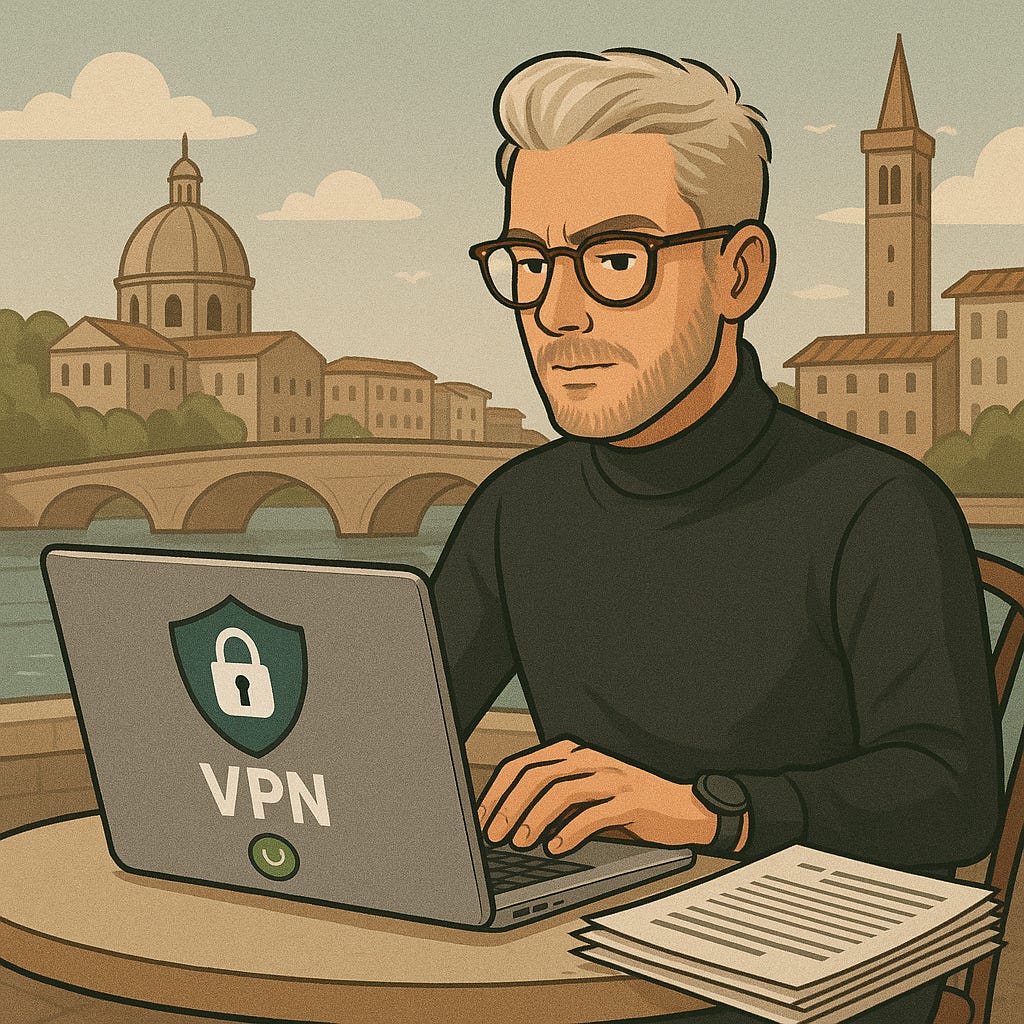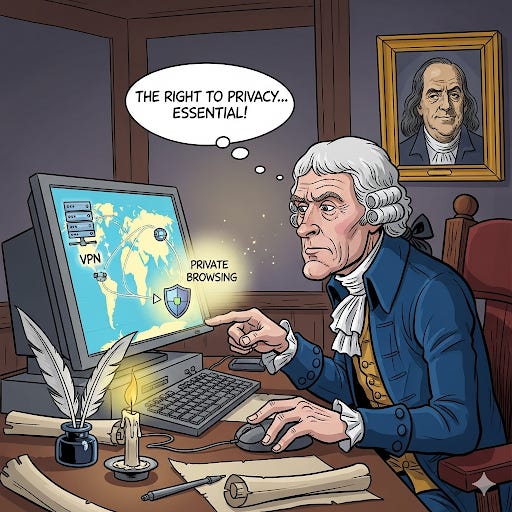The Case for VPNs
Privacy, Streaming, and a Little Bit of Stubborn Freedom
Every time you connect to public Wi-Fi — at the airport, your favorite coffee shop, or that hotel that has a “business center” that is just a desk in the lobby, you’re taking a risk. Hackers can set up fake hotspots, your internet traffic may not be encrypted, and yes, your activity could be intercepted.
The U.S. government even warns against using public Wi-Fi for sensitive things like banking unless a VPN protects you. (So no, I’m not just being paranoid here.)
So let’s break it down: what a VPN actually is, when you should use one, and why I believe everyone, not just “tech people,” should have one in their toolkit.
What Is a VPN?
VPN stands for Virtual Private Network. In plain English, it’s like a secure tunnel between your device and the internet.
When you use a VPN, your internet traffic is encrypted and routed through a server run by the VPN provider. That means:
Your IP address (basically your digital location) is hidden.
Your data is scrambled, so hackers and even your internet provider can’t easily see what you’re doing.
Think of it like sending a letter inside a locked safe, rather than a clear envelope. Only instead of a love letter, it’s your bank login, Netflix password, or intriguing late-night Google searches.
When & Why You Should Use a VPN
Here are the most common situations where a VPN is useful:
Public Wi-Fi Security – Coffee shops, hotels, airports (these networks are basically playgrounds for hackers.)
Privacy at Home – Your internet service provider (ISP) can (and does) track your browsing. In the U.S., it can even be sold.
Travel & Streaming – Want to watch your shows when you’re abroad? VPN. Done.
Avoiding Price Discrimination – Flight websites are notorious for showing different prices based on your location. A VPN helps level the playing field.
Bypassing Censorship & Restrictions – In some countries, a VPN keeps the internet open. And in some U.S. states, you now need to show your driver’s license to visit an adult website. A VPN can bypass such location-based restrictions.
⚠️ Quick Disclaimer - Not Legal Advice
Look, I’m not telling you to break laws, ignore service agreements, or do anything that’s going to land you in front of a judge explaining your browser history. What you choose to do with a VPN is up to you. My point is simply this: you should understand how these tools work and what they make possible. Informed beats ignorant every single time.
A Note on Privacy
You’ve probably heard the old saying: “If you’ve got nothing to hide, you’ve got nothing to worry about.”
I believe that to be 100% malarky.
Privacy isn’t about hiding something “bad.” It’s about protecting your personal information from being misused, sold, or exploited without your consent. You wouldn’t hand out your credit card numbers to strangers on the street — and you shouldn’t treat your digital life any differently.
In a world where data collection has become the business model of the internet, choosing privacy is basically self-defense.
Privacy Is Bigger Than Just Browsing
If you think privacy is just about hiding what you Google at 2 a.m., think bigger.
The Fourth Amendment to the U.S. Constitution protects us from “unreasonable searches and seizures.” That principle — the idea that the government shouldn’t just rifle through your stuff without cause — is at the core of American privacy rights.
And yet, Edward Snowden showed us just how far mass surveillance had already gone. Entire populations swept up in bulk data collection, without warrants, without transparency. Love him or hate him, the guy proved that privacy isn’t just an abstract idea — it’s something governments and corporations are constantly testing the boundaries of.
So no, using a VPN isn’t some tinfoil-hat hobby. It’s one small way of saying: my data is mine. And frankly, I think the founders would approve of that kind of stubbornness.
What a VPN Won’t Do
VPNs are powerful tools, but they aren’t magic. Let’s be clear:
They won’t make you 100% anonymous.
They can’t stop phishing scams or malware — don’t click shady links, okay?
And “free” VPNs are usually sketchy. If you’re not paying for the service, you are the product. Recently, a popular free vpn service that was a Chrome extension was caught taking screenshots of its users.
Do You Really Still Need a VPN?
Some folks argue VPNs aren’t as necessary today. And they’re not entirely wrong. Most websites now use HTTPS encryption, and browsers like Firefox and Chrome support DNS-over-HTTPS, which hides some of your browsing activity from your ISP. That’s real progress.
But here’s the rub:
Your ISP can still see which websites you visit.
Public Wi-Fi is still vulnerable to snooping and fake hotspots.
Many mobile apps don’t handle encryption properly — and you’d never know.
Yes, VPNs shift the trust from your ISP to your VPN provider, which means you need to pick a provider carefully. Not all of them deserve your trust (in fact, some are downright shady).
So, do you need a VPN? Not for every situation. However, for most people, it remains one of the easiest and most accessible ways to add an extra layer of privacy and security with just one click.
And remember: privacy isn’t about having something to hide — it’s about having control.
The Bottom Line
A VPN isn’t about paranoia. It’s about smart, everyday protection. Whether you’re working from an airport, checking your bank account at a hotel, or just wanting to keep nosy companies out of your business, a VPN is one of the simplest ways to safeguard your digital life.
There are dozens of VPNs on the market, but only a handful that I’d actually trust. I’ve tested them, and I’ve narrowed it down to my top five VPNs that are worth your money (including my personal favorite).
Those full reviews, along with real-world use cases, are available to paid subscribers. If you’ve been considering an upgrade, this is a great place to start. You’ll walk away knowing exactly which VPN fits your needs.





